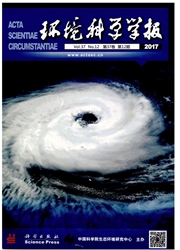

 中文摘要:
中文摘要:
水体中的有机质、无机盐及酸碱度是影响纳米材料迁移转化的主要因素.考察了Na+、Mg(2+)、Ca(2+)、Sr(2+)和Ba(2+)对Fe3O4磁性纳米材料(Magnetic Nanoparticles,MNPs)的沉降作用.结果表明,Fe3O4MNPs的沉降作用是水体pH、金属离子化合价、离子强度共同影响的结果.整体上,碱土金属离子较Na+更能加速Fe3O4MNPs的沉降.当pH为5.0时,浓度低于1.0 mmol·L(-1)的Na+、Mg(2+)和Ca(2+)有助于Fe3O4MNPs的悬浮;当浓度大于1.0 mmol·L(-1)时,较强的离子强度促使Fe3O4MNPs团聚,发生沉降.当pH为9.0时,碱土金属离子较Na+更能促使Fe3O4MNPs聚沉.因此,纳米颗粒在水体中的扩散和聚沉需要综合考虑金属离子种类和浓度.
 英文摘要:
英文摘要:
Inorganic ion,organic matter and pH,are key factors for aggregation of nanoparticles in aquatic environment. In this study,effects of metal ions including Na+,Mg(2+),Ca(2+),Sr(2+)and Ba(2+)on sedimentation of Fe3O4 MNPs were investigated. Results show that the sedimentation of Fe3O4 MNPs were affected jointly by pH of aquatic environment,valence state and ionic strength of metal cations. Generally,the alkaline-earth metal cations could accelerate the sedimentation of Fe3O4 MNPs more than Na+. At pH 5.0,when concentrations of Na+,Mg(2+)and Ca(2+)were below 1.0 mmol·L(-1),these metal cations could slow the sedimentation process of Fe3O4MNPs; however,the sedimentation of Fe3O4 MNPs would be accelerated when concentrations of metal cations were greater than 1.0 mmol·L(-1). At pH 9.0,alkaline-earth metal ions significantly facilitated the sedimentation of Fe3O4 MNPs more than Na+,as a result of effect of valence state of metal cations. Therefore,diffusion and sedimentation of nanoparticles should be assessed considering the species and concentrations of metal cations in aquatic environment.
 同期刊论文项目
同期刊论文项目
 同项目期刊论文
同项目期刊论文
 Cetyltrimethylammonium Bromide-Coated Fe3O4 MagneticNanoparticles for Analysis of 15 Trace Polycycli
Cetyltrimethylammonium Bromide-Coated Fe3O4 MagneticNanoparticles for Analysis of 15 Trace Polycycli Spatial and temporal distribution and sources of polycyclic aromatic hydrocarbons in sediments of Ta
Spatial and temporal distribution and sources of polycyclic aromatic hydrocarbons in sediments of Ta Surfactant-modified flowerlike layered double hydroxide-coatedmagnetic nanoparticles for preconcentr
Surfactant-modified flowerlike layered double hydroxide-coatedmagnetic nanoparticles for preconcentr 期刊信息
期刊信息
